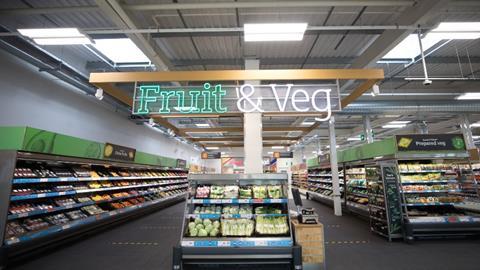Food Foundation report praises Sainsbury’s and Tesco, while Morrisons and Asda are told to do more
Sainsbury’s and Tesco have been praised for their work promoting healthy, sustainable food, with Morrisons and Asda criticised for not doing enough.
The Food Foundation’s annual report on the State of the Nation’s Food Industry has identified Britain’s best and worst-performing supermarkets, caterers and restaurant chains in its league table of what businesses are doing to promote healthy, sustainable food.
According to the charity, the report shows ”the urgent need for a legally enforced framework of health and sustainability targets across the food industry if we are to address the twin challenges of obesity-linked disease now crippling the NHS, and the destructive impact of modern food production systems and eating habits on environment and climate.”
The outlets praised for their forward-thinking efforts to tackle these issues include Lidl, Tesco and Greggs as well as the current leaders, Sainsbury’s. Those exposed for their inertia include Morrisons and Asda.
The most proactive retailers are already working on targets and metrics to assess their progress towards improving their customers’ diets and health, the report states.
Conversely, there has been little or no effort in this direction from caterers, restaurant chains or fast-food outlets with average calorie content for restaurant and takeaway foods double that of foods offered by supermarkets.
The report shows food-to-go retailer Greggs standing out as the only quick-service restaurant to have a target for sales of healthy food.
Call for a mandatory scheme
The Food Foundation, along with a number of supportive businesses, are calling on the government to introduce a mandatory scheme for all large UK food businesses to report on sales of fruit and vegetables, sales of high fat salt and sugar foods, plant and meat-based proteins, and the tonnage of unsold food which is thrown away. The scheme was originally proposed in the government-commissioned National Food Strategy published last year.
Only 10 of the 27 major food businesses investigated by the Food Foundation publish any valid data to show their efforts to address sustainability and health targets.
Fewer than half of the major supermarket chains make any effort to report their sales of healthier foods, sales of fruit and vegetables, or sales of animal and plant-based proteins. Sainsbury’s is the only supermarket to report on all three of these metrics.
Greggs is the only fast-food outlet with a target for sales of healthy food. Only a quarter of restaurant chains or caterers report sales of fruit and vegetables. None report sales of animal versus plant-based proteins.
The report also highlights:
- A lack of support among UK food businesses to address the huge imbalance in advertising between unhealthy versus healthy food. Fruit and vegetable promotion receives just 1% of marketing spend;
- The need for supermarket chains to give more support to low-income families. Only Sainsbury’s and Iceland currently promote the government’s Healthy Start scheme intended to support access to fruit, vegetables and milk for children aged under four;
- The widening gap between the cost of healthy and unhealthy foods, with healthy foods three times more expensive per calorie. This gap continues to widen due to the cost of living crisis: in 2021-22 the price of healthy food increased at twice the rate of less healthy foods (5.1% vs 2.5%).
Food Strategy commitments
The Food Foundation wants to see recognition that mandatory reporting is essential for government to meet its calorie and sugar-reduction targets and its duty to protect public health and sustainable economic growth, with the government acting to make good on the commitments made in the Food Strategy White Paper to implement mandatory reporting across a range of health and sustainability metrics for large businesses.
It also wants consistent legal definitions for healthy and sustainable foods applied across the board, efforts to address imbalanced marketing spend between the least healthy and the healthiest foods, and more accountability from caterers, takeaways and restaurant chains.
Nutritionist Rebecca Tobi, who is the Food Foundation’s senior business and investor engagement manager, said: ‘The need for food businesses to address the twin issues of diet-related ill health and the climate crisis is more urgent than ever. If we are to meet government’s net-zero commitments on climate change and reverse the downward trajectory of the nation’s health, it is imperative that food businesses recognise their responsibility. The retail sector is currently ahead when it comes to health and sustainability commitments – it’s time for caterers, restaurant chains and fast-food outlets do the same.”




